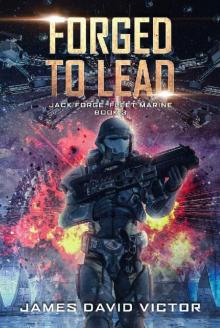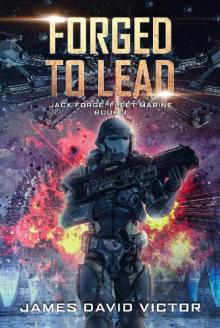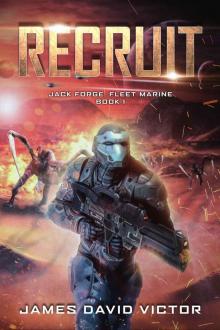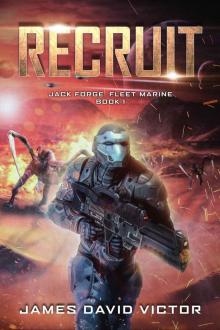- Home
- James David Victor
The Kepler Rescue Page 5
The Kepler Rescue Read online
Page 5
Cready. That’s me. But it wasn’t a blood sample, instead, it looked to be just a clear solution.
“What’s that?” he asked, as he knew that he would probably get more answers from what Palinov wouldn’t say than what she would.
“Just your antibiotic culture. We grow them now, using traces of bio-engineered viruses. Nothing to worry about. No side effects.”
Serum 21? Solomon thought. That was what he had overheard them talking about—this very lady, he was sure, just a few months ago, when they had thought that he had been asleep. They had said that it was part of a ‘program,’ but it wasn’t one that any of the Outcasts had been told about.
“Oh,” Solomon said, and tried to not flinch when she stuck a needle of the substance into his arm. He gritted his teeth and held his breath, waiting for whatever might happen, to happen.
But nothing did.
“See? I told you that there were no side effects. This will just keep your body in tip-top condition.”
Why me? Solomon thought. Why didn’t she call all of the Outcasts here for their supposed ‘antibiotic top-up’?
“Now, if you will just lie back and relax,” Palinov instructed, holding the small control device over his body.
“It’s fine. I’m complying,” Solomon was quick to say, but Palinov just gave a small shake of her head and ignored him. Cready saw that she was using the control device the way that others might use a detector of some kind. Not only could it communicate to the control chip implanted in his neck, Solomon realized, but clearly that chip must be able to send back readings as well. But readings of what?
“Hmm.” Palinov paused, picking up her data-pad as she synced the two devices and looked at the readouts. Her brow tightened a little, as if the test results were interesting, strange, or alarming.
“Tell me, Mr. Cready, do you remember any serious illnesses as a child?” she asked lightly, setting down both the data-pad and the control device.
Phew! Solomon was starting to get jittery around that evil little thing.
The doctor retrieved a variety of more mundane medical devices including bands that slapped onto his arms and forehead, and read such things as heartrate, blood pressure, temperature, etcetera.
“Not that I remember.” Cready shrugged. He had a rather uneventful childhood, from what he recalled. It was like his life had started when he had snuck into New Kowloon, desperate to make a name for himself and to put his talents to good use. He had dim, hazy memories of a time in the American Confederacy Midwest; long fields of genetically-modified golden corn, and the tower of the harvester in the background, slowly chugging away, night and day.
It had been so utterly boring, he told himself. So utterly boring that he had to get out.
There were other fragmentary memories, of course, like the technical college where he had studied electronic engineering. Again, boredom and wasted talent had turned that short escapade into mush. Better off forgotten.
“I see.” Palinov frowned, studying him for a moment, before retrieving a small visor that looked like a set of shades but with larger, pull-down screens attached. “Can you run through these initial tests for me? We need to keep an update on your cognitive functioning.”
I thought you did that every couple of days through Oracle? Solomon thought about the Ganymede mainframe: a low-cognizant AI—no personality, just data-sorting—that gave them ‘learning opportunities’ in their scheduled study hall lessons. Each session spent in the study hall was essentially the same. A personally-tailored education program, which always started with virtual-reality, holographic puzzles to ‘warm up the brain’ and then would switch to an investigation of a topic or event that they had been assigned. So far, Solomon had learned a lot about the general history of the Confederacy, and the Confederate Marine Corps, as well as been guided on several rudimentary introductions to jump theory, space travel, basic biology, modest spacecraft engineering, and other such subjects that every Confederate Marine was supposed to have a passing knowledge of. All of those lessons were child’s play for Solomon, especially compared to the far more advanced command specialism classes that saw him re-enacting battle strategies against holographic foes or studying troop deployment and inter-personal psychology.
Now, however, he was presented with a set of tests that he had never performed before.
There was a field of blue and red, with blotches of green in front of his face, projected by the virtual holographic sensors of the visor.
Hmm. What’s this all about? he thought, moving his hand just as he would in the study hall simulations to see a rippling, glowing cursor highlight over the colored swathes.
They were pixelated, he saw. Small islands of green surrounded by advancing ‘washes’ of red and blue blocks. It would sure help if there were some instructions for this, Solomon thought, but he guessed that was probably the point.
As soon as his ‘hand-cursor’ hovered over one of the colored blocks, he saw that he could control it, turn it in place, making it active or dormant. He did so, choosing some from the small green splotch, as for some reason he felt a little drawn to the underdog.
In response, the field flashed white, and he saw various red and blue blocks become active or dormant and thus Solomon started to understand what he was supposed to do. Immediately, he lost one-half of his green territories as the rival red and blue ‘spreads’ chose to become active against him.
But why didn’t my blocks take over theirs? Solomon thought, and two more turns made him see that it all depended on the ‘weight’ of the color behind the active block. If there were only two adjacent blocks of the same color, then the block could resist an attack, if there were five, then the ‘active’ block initiated a sort of ‘invasion’ mode.
It’s like checkers, or Mah Jong! Solomon realized that the goal of the game was to precisely activate certain blocks at certain times, not always if they could ‘invade’ the enemy territory, but sometime just to ward off an attack.
Solomon happily moved and changed his small green blocks about the field, losing one territory but managing to build a bridge between the other two so that he had a far larger ‘weight’ of color. By the time that Palinov called for him to stop, Solomon had managed to surround and almost take over most of the blue field, and he had left the red field to invade the blue from the other side.
“Very good.” Palinov turned off the simulation and took off the visor, looking at Solomon skeptically for a moment. “Not many people choose green. The weakest of the three colors,” she said lightly, although her voice was loaded with emphasis. “And not many people are able to turn around green’s fortunes if they do.”
“I did well?” Solomon asked.
“Hmm.” Palinov didn’t answer, but was once again back at her handheld data-screen, looking at something. He saw her blink once, twice, and look over at Solomon again. Was that surprise in her face?
“Is there something wrong?” he asked, trying to turn his own concern into a joke. “Are you about to tell me that I’ve only got three days to live now, Doc?”
“Don’t be facetious.” Palinov scowled, suddenly angry for no reason whatsoever. “We’re done here, Cready. Clean bill of health. You may return to your bunk,” she said, turning with her data-screen before pausing. “Oh, and please try to avoid any more fights in the future. Your body and your mind are the future of the Confederacy, so please remember to act like it. Don’t squander it!” she said, which made Solomon want to puke.
The Confederacy doesn’t own me! Solomon thought angrily as he took off the various medical straps and devices. He eased himself from the chair to give a nod at the doctor, then headed for the door.
It seemed that the door controls were only locked from one direction, Solomon noted, as Palinov’s room opened to let him out, as did the main reinforced glass doors to the main, unrestricted part of the Ganymede training station.
The doctor saw something in my results, Solomon thought. His criminal training wasn�
��t just about how to override security systems and how to sneak around quietly. A healthy part of it was also learning how to read people. She had seen something in his results—whether biological or neurological—and it had surprised her enough to make her annoyed. But what!?
Solomon knew that the Outcasts were being treated with some strange ‘Serum 21,’ but he still didn’t know what that was. And were his odd test results something to do with that? It had to be, right?
He didn’t know the answers to those questions, but he smiled grimly to himself as he now knew a way to find out. Under his training suit sleeve, tucked against his wrist, hard-edged and cold, Solomon could feel the identity card that he had lifted from Doctor Palinov.
Solomon might have been famous for breaking into hard-to-reach places, but that didn’t mean that he wasn’t a pretty good finger-smith, as well.
He allowed himself a very small grin as he made his way back to the Outcasts dormitory, to shuffle along the food corridor and receive the rations he had missed out on earlier. He wasn’t thinking about the reprocessed protein and nutrient block, its taste, or how disappointing it seemed. No, now his mind was racing, planning, plotting, as he now had the means to find out exactly what was going on in this place.
5
No Possible Recompense
When Jezebel Wen returned from her early morning training session, she found the bunkroom mostly deserted, apart from the few others who either had free shifts or were allowed, via special compensation from the warden or the doctor, to be convalescing.
That was the way it went in this place, Jezebel knew. If you got something as simple as a sprain or a strain in your constant, daily training schedule, the warden wouldn’t automatically bust you out to the Titan prison camp.
Well, he might do for Sol, she corrected herself as she towel-dried her hair with one of the Ganymede Confederate Marine regulated towels. Everything was regulated here, everything stamped with CMC or Confederate Marine Corps. Even the shower after her morning gymnasium training was regulated—precisely 4 minutes of warm water, precisely 2 minutes of scalding water, precisely 2 minutes of freezing water—so designed to have the maximum ‘metabolic effect’ apparently.
The warden would let those adjunct-Marines that he was pleased with have a free period if the doctor thought that they could convalesce and get better.
But it seemed as though some of the adjunct-Marines in here never did get better, Jezzie saw.
“What’s going on?” she asked Henshi, another Outcast with a sprained knee who was allowed to beg off physical training for a few days. Henshi followed the woman’s eyes to the two bunks that were currently being cleaned out by a team of staffers, the mattresses being taken away, the small locker of personal effects and wall-cupboard being unlocked and opened for the clothes of two adjuncts to be taken away.
“Two more bust out?” she asked, thinking of the three that the warden had made an example of just a few days ago.
“I guess so.” Henshi frowned and shook her head. “I never heard anything, though. That’s Rogan and Cheval from Red and Green Squad, isn’t it?” Henshi added, turning on her bunk to look over to the emptied bunks, worriedly.
Probably because she knows she has to get back to full fitness or else it might be her next, Jezzie thought.
“We’re dropping like flies,” Jezzie murmured, earning a sour grunt of agreement from Henshi beside her. Already, the bunkroom had been depleted of approximately one-fifth of its staff, bringing the total number down to around fifty.
“The warden’s going to have to stop this attrition rate, though,” Jezzie murmured, keeping her voice low in case any of the other wounded or relaxing adjuncts decided to make an example out of her and report this possible questioning insubordination. “I mean, how are the Outcasts supposed to be an effective fighting force if we can’t even field a hundred soldiers?”
“I don’t know,” Henshi muttered, clearly staying out of it.
“I heard they got sick,” called out Erebus, a much larger adjunct who had apparently done so well at his technical specialism—which Jezebel knew meant anything from electronics to starcraft maintenance and mech-walker mechanics—that he had been given this free period every ten-day shift.
“They got sick?” Jezzie asked, keeping her tone level as she made her way past the staffers to her own bunk. Hadn’t Solomon been talking about that weird flu that went around last cycle? He claimed that it was unusual—and that there shouldn’t be any viral contaminants on Ganymede—but what did he know? Weren’t viruses supposed to be, like, one of the most adaptable and hard-living organisms known to humanity or something?
But he had been right about the fact that even Malady had got sick, and that walking cadaver has his own implanted air-filters, right?
Still, Jezzie hadn’t been totally convinced by Solomon’s argument that it was some strange genetically-modified super-bug, released by the warden to do something to his beloved Outcasts.
“Hmm,” Jezzie mused. The warden DID like to make a big, public showing when he busted someone out of the Corps, she reflected. It was the sort of man he was—a small man with a position that was too big for him, she knew. The sort that needed to make an example of his authority.
“Excuse me, Adjunct-Marine Wen,” said one of the staffers in his gray and silver overall. One of the newly-vacated bunks was right next to hers after all, and she moved out of the way to let the man pull the mattress from the wire frame and heave it onto one of the trolleys.
“Excuse me,” the man repeated again, even though Wen wasn’t in the man’s way. She looked up to see what the problem could be and saw that it was the same staffer who had confronted her just a few days ago—the Yakuza operative.
“What do you want?” she hissed. Seeing him here, so close to where she slept, was like one of the warden’s electric jolts through her body. Her eyes slid to the other Outcasts, but none of them seemed to have noticed or even care what trouble Wen might be having with one of the staffers.
Keep your own nose clean. Do your training. That appeared to be the unwritten law of the Ganymede training center, after all.
What does he want? Should I shout? Could I expose him? All of those thoughts ran through Jezebel Wen’s mind, but none of them added up to anything other than her getting shipped off to Titan for daring to question or strike Marine staff. And out there on the frozen prison world, Jezebel knew that the Yakuza and the Triads and the Mob and the White Brotherhood and every other nasty little criminal syndicate had a far greater presence. The possibility of being knifed in her sleep here was at least unlikely, as it would raise too many questions. Out there, it was almost a given.
A pleased, smarmy-sounding grunt from the man opposite her, and he just tapped a finger to the CMC regulation cap that had obscured his features beforehand, as he turned around to wheel the trolley away.
He probably volunteered for that job, Jezebel thought. Just to put the scare on me. She knew the game with her old paymasters, after all. She had been one of them, so she knew that the build-up was always the same: intimidate, make a show of strength, and then ask the victim to do something they don’t want to.
And if they don’t? Well, the Yakuza punishments for non-compliance were even worse than the ones that the warden doled out with relish. Only the crippling pain that the Yakuza delivered—that she herself had delivered to people on occasion—was usually life-changing: missing digits, missing limbs, bankruptcy, homelessness, debt, life-long scarring…
Fracker. She gritted her teeth and turned back to her bunk.
And that was where the message was. There, on her pillow, was a tiny curl of paper—no bigger than Jezzie’s thumbnail—that she knew only too well. She snatched it up as she lay on her bunk, pretending to catch twenty minutes of much-needed rest before the next training session.
The Yakuza were nothing if not old-school, she knew, and a scroll like this only proved it. Admittedly, they had made a few concessions in the recent c
enturies of the Confederate globalization of Earth—they now accepted part-Japanese gang members like Jezebel Wen, for example—but they were still in the High Edo Period when compared with such groups as the Triads.
When Jezzie unrolled the scroll, she found that it was just as she had expected, a set of minimal command statements written in tiny, Hyogo dialect. The Yakuza probably had the money to create special encoded transmissions or even spy-drones to deliver their messages, but they also knew that some of the oldest methods were the best. A message this small, although obvious, didn’t leave a trail of electronic breadcrumbs or transactions to follow. It could easily be disposed of, flushed-away, shredded, or eaten. Its secrecy relied upon the fact of the receiver’s professionalism and dedication to the Yakuza—not the sender.
Jezebel read the message, and her heart sank.
S. Cready owes. Judged. No possible recompense.
That was all that it said, but that was all that the small message needed to say for Jezebel Wen to understand precisely what her boss, Mr. Mihashi of the largest Yakuza clan in the Asia-Pacific Partnership, wanted her to do.
S. Cready = Solomon Cready, she mentally translated, her own Gold Squad Commander.
He had been judged, which meant that senior Yakuza elders had already met and held a secret trial over whatever crimes or evidence they had against him, which, Jezebel presumed, was money—although ‘owing’ could mean anything from a debt of service to a pact that he had yet to honor.
Not that he had time to honor it now. Jezebel frowned. The last part of the message had clearly stated what was expected of her. There was ‘no possible recompense,’ which meant that Solomon, somehow, had already gone past all of any other options of repayment in kind or of service, and now there was only one final option left.
Solomon Cready had to die, by her hand.
6
Serum 21

 Ranger Bayne
Ranger Bayne Valyien Boxed Set 3
Valyien Boxed Set 3 Mimic's Last Stand
Mimic's Last Stand A. I. Uprising (Valyien Book 4)
A. I. Uprising (Valyien Book 4) The Kepler Rescue
The Kepler Rescue Last Stand Boxed Set
Last Stand Boxed Set Challenge of Steel
Challenge of Steel Mimic Saves Her People
Mimic Saves Her People Enemy Within (Jack Forge, Lost Marine Book 7)
Enemy Within (Jack Forge, Lost Marine Book 7) Warp Gate (Valyien Far Future Space Opera Book 7)
Warp Gate (Valyien Far Future Space Opera Book 7) A. I. Apocalypse (Valyien Far Future Space Opera Book 8)
A. I. Apocalypse (Valyien Far Future Space Opera Book 8) Captain Bayne Boxed Set
Captain Bayne Boxed Set Blue Star Marine Boxed Set
Blue Star Marine Boxed Set Night Raiders
Night Raiders Conquest of Earth
Conquest of Earth Betrayal (Jack Forge, Lost Marine Book 6)
Betrayal (Jack Forge, Lost Marine Book 6) Sharpe End
Sharpe End Parallax
Parallax Invasion- Proxima
Invasion- Proxima The Torgoran Revolt (Plundering the Stars Book 3)
The Torgoran Revolt (Plundering the Stars Book 3) Outcast Marines series Boxed Set 2
Outcast Marines series Boxed Set 2 Outcast Marines series Boxed Set
Outcast Marines series Boxed Set Captain Bayne
Captain Bayne Outcasts of Earth (Outcast Marines Book 1)
Outcasts of Earth (Outcast Marines Book 1) Lost Marine
Lost Marine Eternal Enemy
Eternal Enemy Command Code
Command Code Ranger Bayne (The Deep Black Book 3)
Ranger Bayne (The Deep Black Book 3) Mimic: The Space Shifter Chronicles Boxed Set (Books 1 - 9)
Mimic: The Space Shifter Chronicles Boxed Set (Books 1 - 9) The Deep Black Space Opera Boxed Set
The Deep Black Space Opera Boxed Set Federation at War (Blue Star Marines Book 1)
Federation at War (Blue Star Marines Book 1) AI Uprising
AI Uprising The Xarren Escape (Plundering the Stars Book 2)
The Xarren Escape (Plundering the Stars Book 2) Valyien Boxed Set 1
Valyien Boxed Set 1 New Enemy (Jack Forge, Lost Marine Book 4)
New Enemy (Jack Forge, Lost Marine Book 4) Alien Legacy
Alien Legacy A I Apocalypse
A I Apocalypse Invasion (Blue Star Marines Book 3)
Invasion (Blue Star Marines Book 3) Alliance (Jack Forge, Lost Marine Book 5)
Alliance (Jack Forge, Lost Marine Book 5) Double Sharpe (Raven Sharpe Chronicles Book 2)
Double Sharpe (Raven Sharpe Chronicles Book 2) Metal Warrior: Steel Cage (Mech Fighter Book 6)
Metal Warrior: Steel Cage (Mech Fighter Book 6) Parallax (The Deep Black Book 1)
Parallax (The Deep Black Book 1) Metal Warrior: Steel Curtain (Mech Fighter Book 8)
Metal Warrior: Steel Curtain (Mech Fighter Book 8) Mech Warrior: Born of Steel (Mechanized Infantry Division Book 1)
Mech Warrior: Born of Steel (Mechanized Infantry Division Book 1) Outcast Marines Boxed Set
Outcast Marines Boxed Set Metal Warrior: Ring of Steel (Mech Fighter Book 7)
Metal Warrior: Ring of Steel (Mech Fighter Book 7) The Elarri Heist (Plundering the Stars Book 1)
The Elarri Heist (Plundering the Stars Book 1) Forged Under Siege (Jack Forge, Fleet Marine Book 6)
Forged Under Siege (Jack Forge, Fleet Marine Book 6) Forging a Trap (Jack Forge, Fleet Marine Book 8)
Forging a Trap (Jack Forge, Fleet Marine Book 8) Daikon (ESS Space Marines Book 2)
Daikon (ESS Space Marines Book 2) Mimic Changes the World
Mimic Changes the World Double Sharpe
Double Sharpe Invasion- Pluto
Invasion- Pluto Mimic and the Fight for Freedom (Space Shifter Chronicles Book 3)
Mimic and the Fight for Freedom (Space Shifter Chronicles Book 3) Forged in Battle (Jack Forge, Fleet Marine Book 5)
Forged in Battle (Jack Forge, Fleet Marine Book 5) Lykos (ESS Space Marines Book 6)
Lykos (ESS Space Marines Book 6) Metal Warrior: Precious Metal (Mech Fighter Book 5)
Metal Warrior: Precious Metal (Mech Fighter Book 5) Forged to Hunt
Forged to Hunt Earth Space Service Space Marines Boxed Set
Earth Space Service Space Marines Boxed Set Alpha Rises
Alpha Rises Power of the Seers (Dragon Oracle Book 4)
Power of the Seers (Dragon Oracle Book 4) Forged to Lead (Jack Forge, Fleet Marine Book 3)
Forged to Lead (Jack Forge, Fleet Marine Book 3) Nebula (ESS Space Marines Book 4)
Nebula (ESS Space Marines Book 4) Forged in Darkness
Forged in Darkness Forged in Space
Forged in Space Metal Warrior: Steel Trap (Mech Fighter Book 3)
Metal Warrior: Steel Trap (Mech Fighter Book 3) Mimic and the Space Engineer Boxed Set, Books 1 - 3
Mimic and the Space Engineer Boxed Set, Books 1 - 3 World Breaker Boxed Set (ESS Space Marines Omnibus Book 3)
World Breaker Boxed Set (ESS Space Marines Omnibus Book 3) Forged to Lead
Forged to Lead Escape (Jack Forge, Lost Marine Book 3)
Escape (Jack Forge, Lost Marine Book 3) Forged Under Siege
Forged Under Siege Jack Forge, Fleet Marine Boxed Set (Books 1 - 9)
Jack Forge, Fleet Marine Boxed Set (Books 1 - 9) Forged in Darkness (Jack Forge, Fleet Marine Book 4)
Forged in Darkness (Jack Forge, Fleet Marine Book 4) Insurrection
Insurrection Mimic Betrayed (Space Shifter Chronicles Book 6)
Mimic Betrayed (Space Shifter Chronicles Book 6) Mimic Goes to War (Space Shifter Chronicles Book 5)
Mimic Goes to War (Space Shifter Chronicles Book 5) Recruit (Jack Forge, Fleet Marine Book 1)
Recruit (Jack Forge, Fleet Marine Book 1) Mimic Betrayed
Mimic Betrayed Power of the Seers
Power of the Seers Mimic and the Journey Home (Space Shifter Chronicles Book 2)
Mimic and the Journey Home (Space Shifter Chronicles Book 2) Mimic and the Space Engineer (Space Shifter Chronicles Book 1)
Mimic and the Space Engineer (Space Shifter Chronicles Book 1) Recruit
Recruit Forged to Hunt (Jack Forge, Fleet Marine Book 7)
Forged to Hunt (Jack Forge, Fleet Marine Book 7) Forged by War (Jack Forge, Fleet Marine Book 9)
Forged by War (Jack Forge, Fleet Marine Book 9) Pursuit (Silver Cane Book 1)
Pursuit (Silver Cane Book 1) Zenith (ESS Space Marines Book 1)
Zenith (ESS Space Marines Book 1) Star Chaser (ESS Space Marines Book 3)
Star Chaser (ESS Space Marines Book 3) Forged in Space (Jack Forge, Fleet Marine Book 2)
Forged in Space (Jack Forge, Fleet Marine Book 2) Defense (Silver Cane Book 2)
Defense (Silver Cane Book 2) Infiltrate (Silver Cane Chronicles Book 3)
Infiltrate (Silver Cane Chronicles Book 3) Alpha Rises (Valyien Book 2)
Alpha Rises (Valyien Book 2) Mimic Raises an Army
Mimic Raises an Army Alien Evolution (Valyien Book 3)
Alien Evolution (Valyien Book 3) Arkana (ESS Space Marines Book 4)
Arkana (ESS Space Marines Book 4) Lykos
Lykos Forging a Trap
Forging a Trap Mimic Goes to War
Mimic Goes to War Earth Space Service Boxed Set: Books 1 - 3 (ESS Space Marines Omnibus)
Earth Space Service Boxed Set: Books 1 - 3 (ESS Space Marines Omnibus) Stranded (ESS Space Marines Book 7)
Stranded (ESS Space Marines Book 7) Mimic Raises an Army (Space Shifter Chronicles Book 4)
Mimic Raises an Army (Space Shifter Chronicles Book 4) Alien Evolution
Alien Evolution